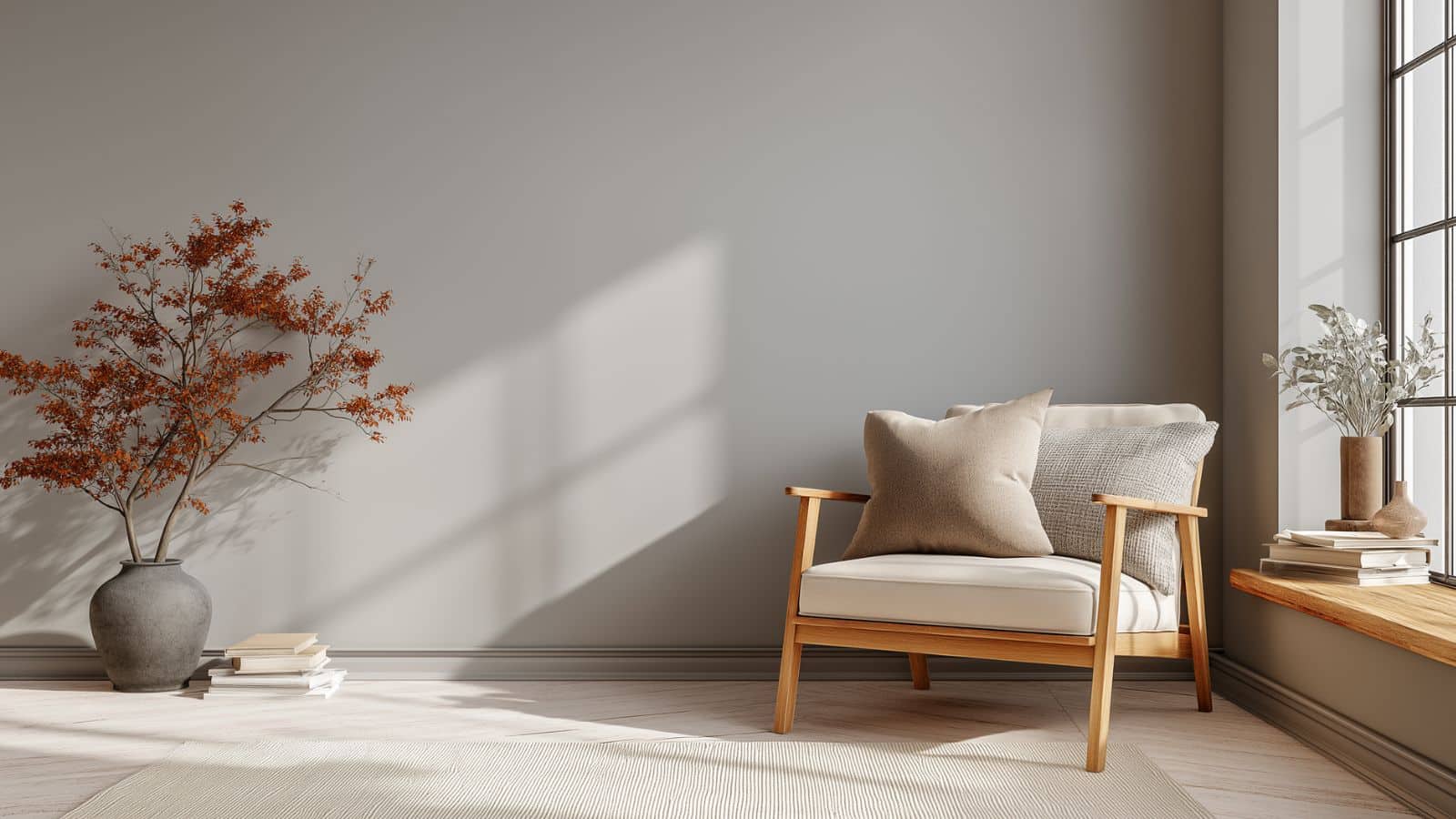Minimalist Reading Room Designs for Calm Spaces That Inspire Focus and Serenity
Table of Contents
Imagine a space where every element exists for a reason: no visual clutter, only purposeful comfort. That’s the power of a minimalist reading room—a sanctuary designed to calm the mind and encourage moments of stillness. In our fast-paced digital world, carving out a peaceful retreat is more essential than ever.
Research shows that cluttered environments can heighten stress and hinder concentration. A minimalist room, with its clean lines and intentional simplicity, promotes relaxation and sparks creativity. For book lovers, writers, or anyone craving quiet focus, a well-designed minimalist reading nook or room offers solace and clarity.
This guide delves into the core principles behind minimalist reading room designs. We’ll walk through essential elements like soothing color palettes, functional furnishing, intentional lighting, and clever storage. Through thoughtful layouts and elegant choices, you’ll learn how to create a calming oasis that aligns with your personal style—without sacrificing warmth or comfort.
Serene color palettes for stress-free reading zones
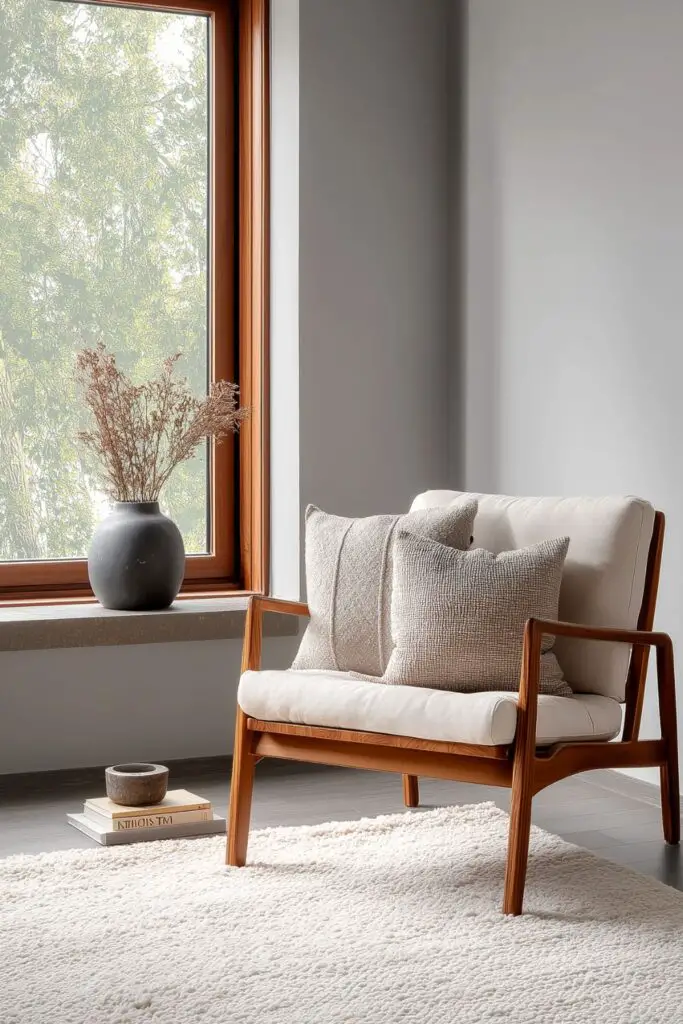
Colors influence mood subconsciously, making them foundational for a calm reading environment. In minimalist designs, soft neutrals—like off-white, greige, pale taupe, or cool gray—lay the groundwork for a serene backdrop. These hues are flexible, timeless, and easy on the eyes.
If you want subtle contrast, consider muted pastels—sage green, dusty blue, or blush—but keep saturation low to avoid visual noise. Avoid bold or bright tones near reading zones; they can create sensory overstimulation.
Using a monochrome palette creates a sense of spaciousness and cohesion. An accent wall in a slightly darker shade can add depth without overwhelming the calm. Pair these with natural materials like linen, wool, and wood to soften the visual experience.
Table: Calming Color Palettes for Reading Spaces
| Palette Type | Colors | Mood |
|---|---|---|
| Neutral base | Off-white, greige, stone-gray | Clean, timeless |
| Muted pastels | Sage, dusty blue, blush | Soft, peaceful |
| Monochrome tones | Light gray to charcoal | Sophisticated, serene |
| Natural accents | Warm wood, beige | Organic, comforting |
Selecting furniture that promotes calm and comfort
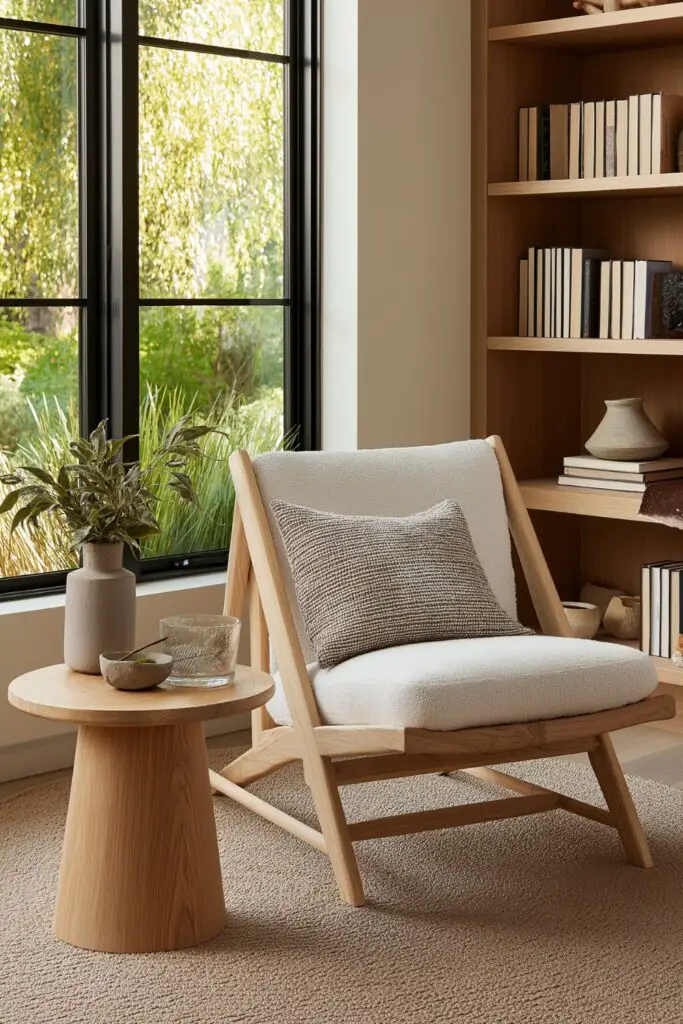
In a minimalist reading room, less is more. Furniture should offer function, comfort, and visual harmony. Start with a well-crafted reading chair—think low profile, gentle curves, and quality upholstery. A wingback or Scandinavian-style lounge chair works beautifully in naturally lit corners.
Complement it with a small side table that’s sleek and purposeful—perfect for a cup of tea or a stack of books. Extendable designs create flexibility in smaller spaces. A minimalist bookshelf or floating shelf can host only your essential reads, avoiding the visual clutter of an overflowing library.
Rugs also matter. A natural fiber rug under the chair grounds the space and adds texture without overpowering. Choose low-pile neutrals that are easy to clean.
Table: Furniture Guide for Cozy Calm
| Item | Recommendations | Purpose |
|---|---|---|
| Reading chair | Scandinavian, wingback, or accent | Supportive seating |
| Side table | Slim, round or square | Holds books, lighting |
| Bookshelf | Open, floating, or ladder | Displays curated collection |
| Rug | Jute, cotton, low-pile wool | Defines space, adds warmth |
Optimizing light and brightness for comfortable reading
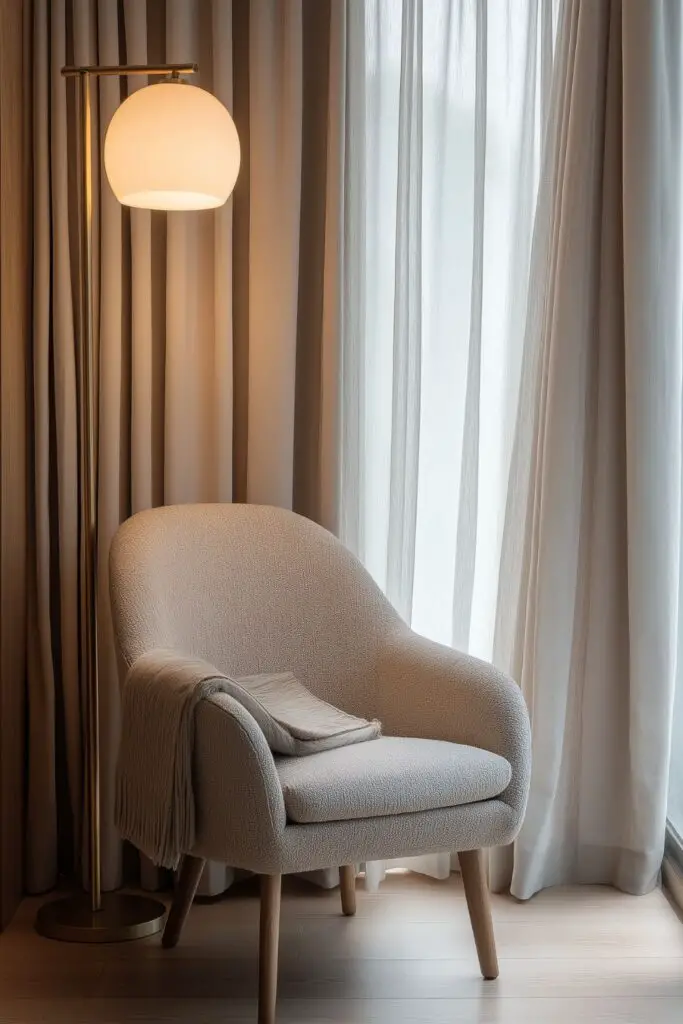
Light sets the atmosphere in a reading room—vital for visibility and mood. Natural light is ideal: position your reading chair near a window with mild daylight. Use sheer curtains to diffuse harsh sun and maintain softness.
Evening and overcast conditions call for ambient and task lighting. A slender floor lamp with an adjustable arm is perfect for directing light onto your book without overwhelming the space. Choose warm LED bulbs (~2700K) for a cozy glow.
In addition to functional lamps, incorporate soft accent lighting—LED cove lights, recessed strips, or plug-in wall sconces add warmth without visual clutter.
Table: Reading Light Essentials
| Light Source | Location | Function |
|---|---|---|
| Natural window | Beside chair | Cozy daytime illumination |
| Floor or table lamp | Arm’s reach | Direct task lighting |
| LED bulbs (2700K) | Lamp source | Warm, eye-friendly glow |
| Ambient lighting | Perimeter or niches | Creates balance |
Intentional storage to minimize visual clutter
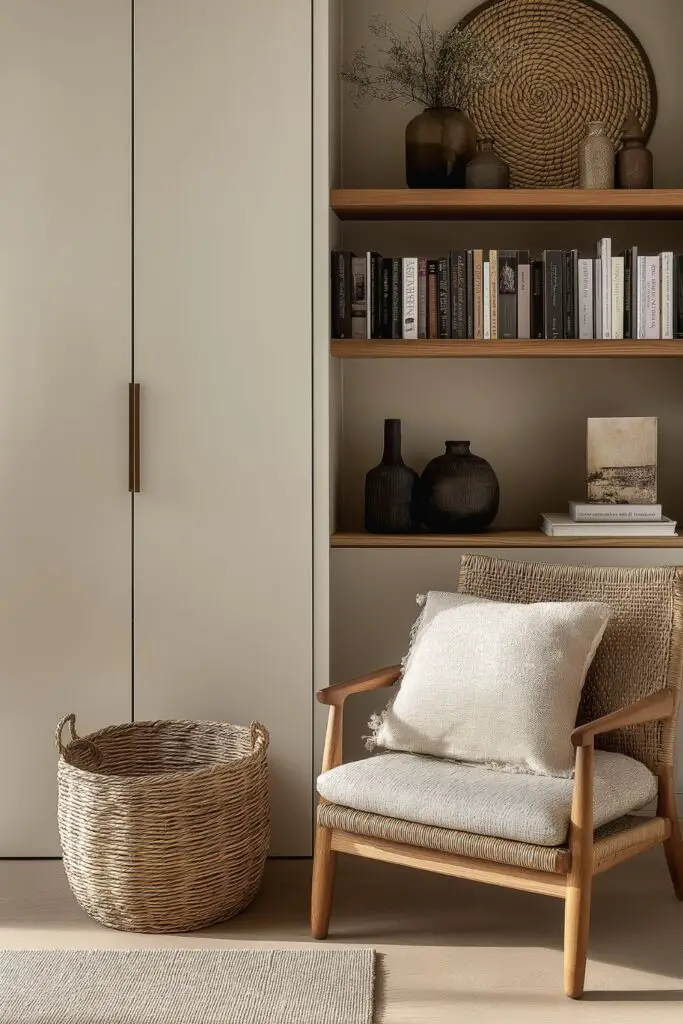
Clutter diminishes calm. Effective storage keeps essentials out of sight but easily accessible. A single closed cabinet or credenza with clean lines offers ample room for extra reads, blankets, and electronics.
Floating shelves can display a handful of books and décor while maintaining simplicity. Keep arrangements balanced—three to five pieces max per shelf, with ample space around each item.
A small decorative basket beside the chair is both functional and stylish for throws or knitting supplies. Every object should serve a purpose; if it doesn’t, it has no place in a minimalist reading space.
Table: Smart Storage Solutions
| Storage Type | Use Case | Visual Impact |
|---|---|---|
| Closed cabinet | Hide bulk items | Streamlined look |
| Floating shelves | Feature curated items | Balanced display |
| Storage basket | Throws or small items | Warmth without clutter |
| Magazine rack | Current reads | Tidy, functional |
| Multi-use furniture | Side table with drawer | Space-efficient |
Styling minimal decorative accents with purpose
In a minimalist reading room, every decorative accent must contribute to a sense of calm and intention. It’s not about eliminating decoration entirely, but curating items that feed the soul without overwhelming the senses.
First, select a small art piece or printed quote that resonates—opt for line drawings, soft abstracts, or nature-inspired photography. Avoid cluttering walls; one or two simple pieces are enough to personalize your retreat.
Next, introduce a touch of greenery. A single potted plant like a peace lily or rubber plant—or dried grasses in a ceramic vase—brings life without demanding attention. The key is restraint; one medium-size plant is more impactful than many small ones.
Consider meaningful objects: a vintage bookmark, a handcrafted mug, or a beautifully bound journal. Keep display surfaces sparse—three to five thoughtful items on a shelf or table create balance, but ten or more can feel chaotic.
Natural textures like linen cushion covers, woven throws, or wood trays add warmth without compromising minimal aesthetics. Anchor the palette with soft tones and tactile harmony.
Table: Purposeful Decorative Accents
| Accent Type | Example | Purpose |
|---|---|---|
| Wall art | Soft abstract print | Visual calm, personal touch |
| Plant | Peace lily in ceramic pot | Biophilic element |
| Tablescape | Stoneware mug, tray, small candle | Simple, mindful styling |
| Textiles | Linen cushion, woven throw | Subtle texture and warmth |
| Sentimental object | Vintage bookmark or book | Encourages connection |
Designing for acoustics and comfort
A truly calm reading room addresses not just visuals but acoustics and tactile comfort. High walls, hard floors, and open windows can cause echoes; soft surfaces help absorb sound and create serenity.
Start with a plush rug—wool, jute blend, or layered rugs can reduce echo and warmth underfoot. Add a drapery panel—even if not needed for light—for both visual softness and acoustic benefit.
Choose upholstered furniture with padded seats and backs. Soft cushions and throws amplifies coziness and dampens sound. If you enjoy ambient background noise, a compact sound machine or speaker can be discreetly integrated into storage.
Temperature control matters too: a plush throw or a minimalist radiator cover with integrated shelf can make the room feel toasty without extra design clutter. Comfort and calm go hand in hand in a space designed for quiet focus.
Table: Comfort and Acoustics Checklist
| Element | Function | Suggested Material |
|---|---|---|
| Area rug | Sound absorption | Wool or jute blend |
| Drapery | Noise reduction | Linen or cotton |
| Upholstery | Cozy seating | Soft linen, boucle |
| Throw blankets | Tactile warmth | Knit or faux fur |
| Sound machine | Helps focus/rest | Discreet device |
Conclusion
Crafting a minimalist reading room isn’t just about aesthetics; it’s about intentional living. By choosing a serene palette, purposeful furniture, thoughtful lighting, and smart storage, you create a calm space that fills your mind with peace rather than distraction.
A well-styled minimalist reading space invites morning coffee, afternoon reflection, and evening escape. It becomes more than a room—it’s a retreat tailored to your soul. With balance and simplicity, you can design a room that feels restful and encourages the most important habit of all: returning to stillness.

